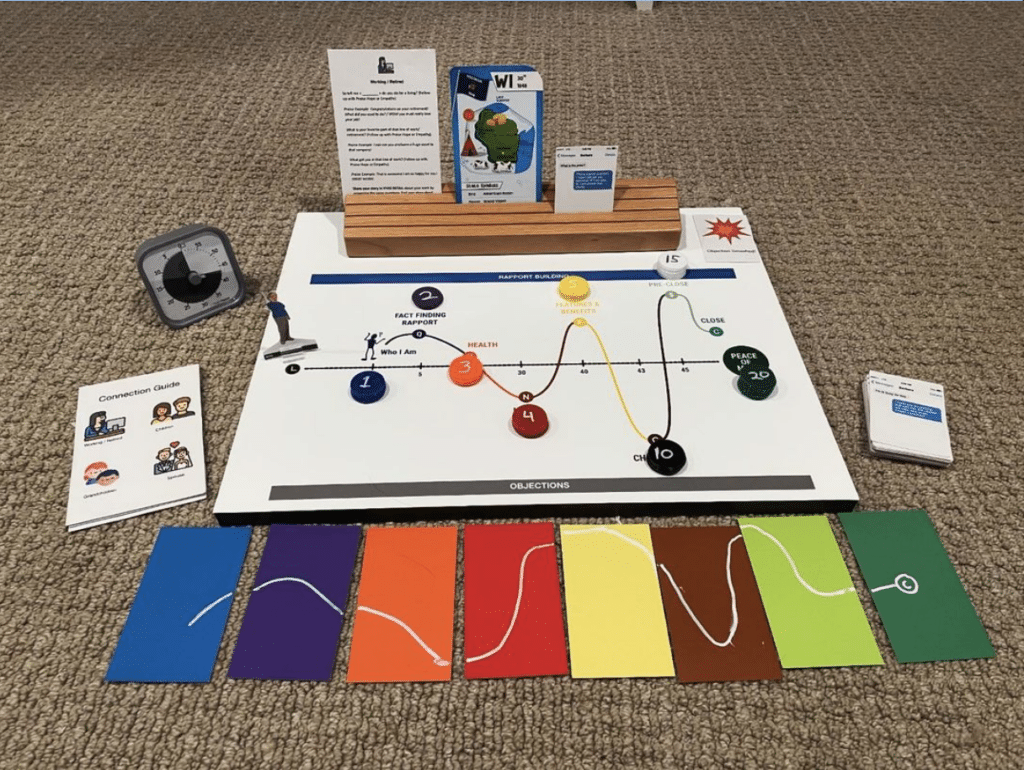

October 14, 2024
Uncategorized

I learned a lot about how to create WOW experiences during my tenure at Zappos. And now I’m applying them to the sales experience (specifically for outbound sales calls with a complex sale).
I’ve developed this sales game (below) that can be used in:
a) Training / Role play
b) On live calls
c) During coaching / mentoring
The game dynamics work so that:
1. The win isn’t just closing the sale. You get a point score at the end of it to track progress over time.
2. The player can see what stage of the process they get stuck on (when they collect the coins at the end of the day), so they know how to ask for coaching help.
3. You see you’re in the sales flow vs when you’re in pure rapport building or objections smashing.
4. You learn how to rapidly smash objections through the additional card game
5. It takes what can be a long and boring sales script and turns it into a fun and engaging game.
Have you thought about creating a game out of your process.
I’d love to help you. Let’s talk (click here)
April 22, 2024
Uncategorized
Here’s my opener for Zendesk…
March 29, 2024
Uncategorized
Everyone knows about the “Trust Fall” – The old hackneyed team-building exercise. And then there’s the rope courses that simulate the feeling like you could lose your life if you don’t depend on your teammates. But as my mentor said, “It all goes out the window when you get back to the office.”
Here are a few tips to building stronger teams that actually work:
1. Shared Adversity
We actually tend to bond more when we’re struggling through something together. But the challenge is making it work-related. Here is a team-building example from the founder of Pictionary. Even if it’s being together through drudgery, that’s where some of the best (and funniest) conversations can happen.
2. Get in Movement
There’s a reason the armed forces march in synchronization, for hours. My team and I used to go for hikes together. My current client is now doing group walks around the office building. We all could use a reason to get out of our chairs, and plus – the best ideas come when we’re away from our computers.
3. Shadowing
There’s no better way for team members to both understand and appreciate what others do than having them sit down for at least an hour and watch someone work. This can also be used to help team members understand people’s roles outside of their own departments. Organizational empathy goes a long way to building company culture.
As always, don’t believe me.
Just try it and see what happens.
January 18, 2024
Great cultures ,Hacks
Almost everything about a culture is different. There are different positions, salaries, skills, genders, races, backgrounds. With all these different perspectives, how can we all agree on reality? What can we call the “single source of truth”?
Some say it’s values but values can change, and people can interpret them differently. In a toxic culture, values can actually be weaponized.
When I present this in a class, I ask, “What can we all agree on that is real?” And of course, everyone looks confused. So I hold up a blue pen, and ask, “Is this pen blue?” Everyone says yes, but if someone is color blind, they would say no. So what reality can we all agree on?
I’ve only found one thing: Time.
We all might have different relationships to time, but when it’s 10:30am Pacific time, no one disagrees with that statement.
So why is this important, and what is the culture hack relating to time?
It’s important because it’s a single truth that we can all navigate around. The highest performance cultures (think: Navy Seals), put a high and precise value on time because it’s a critical coordination point.
For companies, the highest performers:
– Start meetings on time
– End meetings early
– Deliver on deadline
On time is very clear. You’re either on time or you’re not.
The most powerful leaders I’ve worked with are always on time. And people think it’s because of respect, but it’s much more than that. It’s because of agency and control. At Zappos, Tony Hsieh was always on time (both personally and professionally). He never once said, “Sorry I’m late, Jeff Bezos held me back at the meeting.” No, he would have literally walked out before that happened.
What that does is convey confidence to a team that their leader is in charge and not being controlled by other forces or people. It gives people a sense of peace and confidence to know the leader is in fact in control.
Also, when we’re late, it’s like we’re trying to bend reality to our own needs and that never works out well.
As a leader, by setting a high standard of being on time, the rest of the company follows, meetings flow well, and projects get delivered on time. And make sure to start the meetings on time, regardless of whether everyone is there. Delaying a meeting caters to the least conscientious people in the company. And starting it on time ensures everyone will show up the next time on time.
Don’t believe me? Try it out for yourself. Try not only being on time. Try being early. Why? Because if you go for on-time, you’re stressed about getting everywhere exactly on time. If you arrive early, it frees your mind to think about more productive thoughts. And it sets an example by leading by example. Everyone will start arriving early, meetings will start on time with everyone there. The purpose of the meeting will be achieved without stress or wasted time.